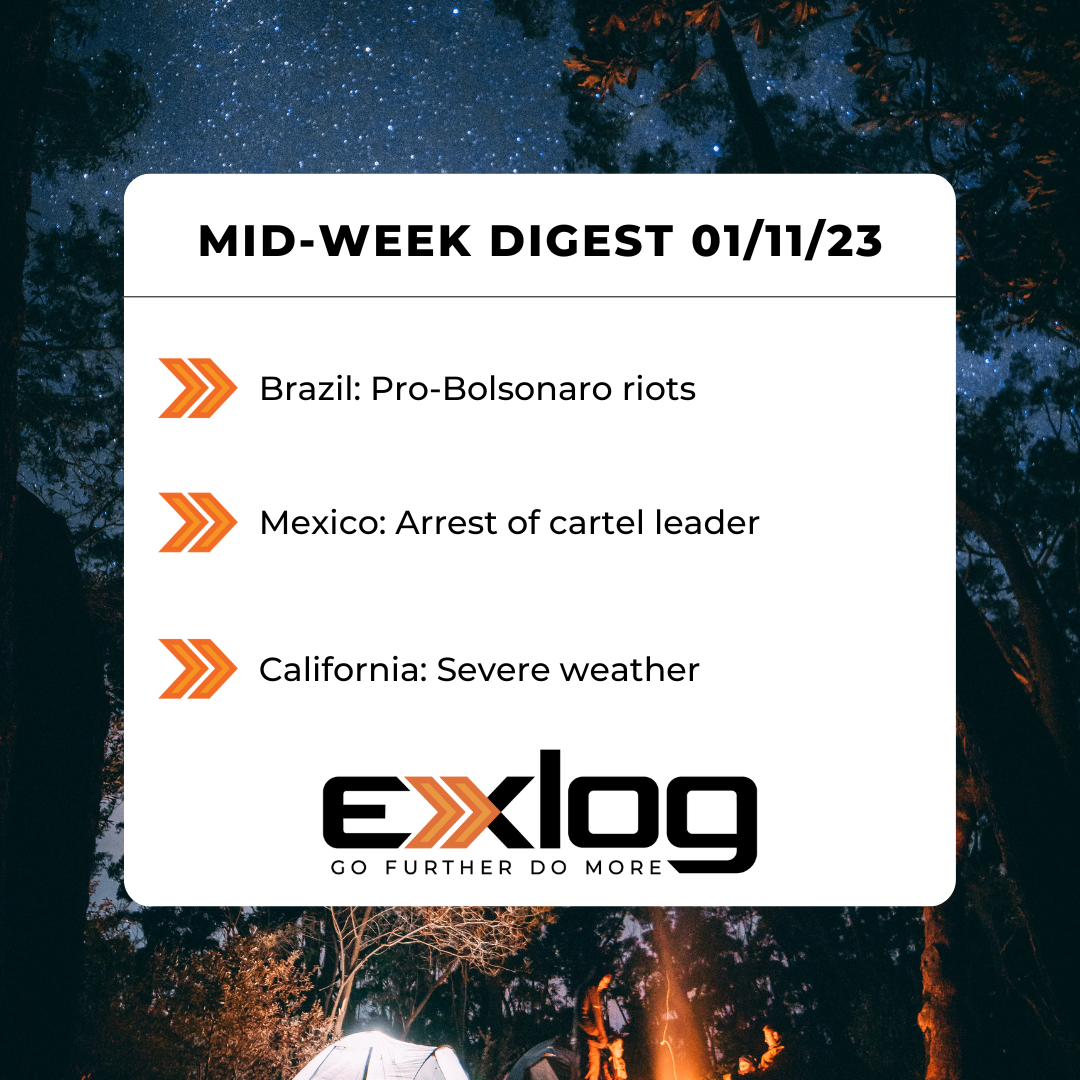Pro-Bolsonaro riots in Brazil, arrest of cartel leader in Mexico and severe weather in California
Brazil: Bolsonaro supporters storm government buildings in Brasilia
The political climate in Brazil remains volatile after supporters of former President Jair Bolsonaro stormed several government buildings and clashed with security forces on Jan. 8, threatening further violence targeting the government. Thousands of rioters broke through police blockades and entered the Brazilian National Congress, the Supreme Court, and the Palacio do Planalto (Presidential Palace), causing severe property damage, looting “trophies,” and destroying documents. By approximately 1730 on Jan. 8, riot police had driven protestors out onto the street and dispersed the crowd by deploying water cannons, tear gas, and stun grenades. Security forces subsequently regained full control of Praça dos Três Poderes, the central square housing federal facilities, erecting roadblocks extending nearly 2 km (1.2 mi) in every direction of the square. The protesters had marched to the government buildings from an encampment—set up by Bolsonaro supporters following his defeat in the Oct. 30 election—located outside the national Army headquarters approximately 4.3 miles (7 km) west of the square. Around 3,000 protestors had been peacefully demonstrating at this camp since the vote, calling for military intervention and the immediate resignation of President Luiz Inácio “Lula” da Silva, who was inaugurated on Jan. 1. Pro-Bolsonaro truck drivers had also created blockades along major highways in the states of Mato Grosso and Parana, including the BR-163 highway. In response to the unrest, Lula ordered a federal intervention in Brasilia until Jan. 31 and deployed additional military police to reinforce security in the capital until at least Jan. 19. Since the Jan. 8 riots, security forces have detained 1,500 protesters, dismantled three pro-Bolsonaro encampments—one in Brasilia and two in the state of Minas Gerais—and cleared the truck blockades. Thousands of pro-government protesters marched through the streets of Rio de Janeiro and Sao Paulo on Jan. 10, demanding punishment and accountability for pro-Bolsonaro rioters, although the demonstrations did not result in significant disruptions. While the federal government managed to swiftly respond to the riots, the currently contentious political situation and rhetoric in Brazil, in addition to the disruption of Brasilia’s public security command, indicates a possibility for further politically motivated violence in the capital and other major cities in the short-to-medium term.
Mexico: Cartel leader’s arrest triggers violent response in Sinaloa
The security environment in Sinaloa and neighboring states could deteriorate in the short-to-medium term following the arrest of Ovidio Guzmán – leader of Los Chapitos, an offshoot of the Sinaloa Cartel. His recent capture and detention by security forces triggered armed confrontations between security forces and criminals, led to dozens of reported casualties, and involved carjackings, arson attacks against vehicles, and roadblocks intercepting travel in Culiacán and two other cities on Jan. 5. Guzmán’s arrest was the result of a joint security operation spearheaded by the Mexican army involving 3,600 personnel. Emboldened by the successful rescue effort during a similar military offensive in 2019, cartel members erected roadblocks in Culiacán, Los Mochis, and Mazatlán, clashed with security forces, and set on fire to or carjacked at least 250 vehicles; several local businesses also reported incidents of looting. Clashes between cartel members and security forces killed 29 people – including 10 soldiers – and injured 35 other soldiers and police officers. In addition to overland travel disruptions, airports in Culiacán, Mazatlán, and Los Mochis were temporarily closed after cartel members opened fire at the Culiacán airport in an attempt to prevent Guzmán’s transfer to Mexico City. In response to the unrest, local authorities issued a shelter-in-place order, closed schools and municipal buildings, and encouraged local businesses to halt their operations; all safety measures have since been lifted. Despite the success of the security raid, Guzmán’s arrest is unlikely to significantly improve the security situation in the state of Sinaloa or other areas controlled by the Sinaloa Cartel. On the contrary, the capture and subsequent power vacuum could fuel a territorial dispute between Sinaloa Cartel factions, potentially leading to elevated levels of intra-cartel violence. In addition, the Sinaloa cartel’s main rival, the Jalisco New Generation Cartel (CJNG), will likely exploit Guzmán’s arrest to increase territorial control and intensify its attacks against the Sinaloa Cartel in the contested regions across Baja California and Zacatecas states – vital routes for fentanyl trafficking.
United States: Severe storms trigger state of emergency in California
President Joe Biden declared a State of Emergency (SoE) in California on Jan. 9 following a series of storms that left casualties, private property damage, and widespread power outages across much of the state. Heavy rainfall and subsequent flooding and mudslides have killed at least 17 people, and more than 135,000 people remain without power as of Jan. 10, with most of the power outages occurring in Northern California’s Bay Area – including the counties of Santa Clara, Santa Cruz, and Sacramento. According to the National Weather Service, most of the state has seen up to 600% more rainfall than usual in the past few weeks; rainfall has been especially heavy in higher-elevation coastal areas and the Sierra Nevada Mountains. The storms have interrupted operations at multiple airports, triggering thousands of flight delays and cancellations since Dec. 23, 2022. In addition to aviation sector disruptions, local authorities have also closed at least 15 highways and freeways due to flooding and rockslides. The storms have damaged numerous homes, roads, and businesses, and at least 90,000 people remained under evacuation orders or warnings across the state as of Jan. 10. While the full extent of economic losses is not yet clear, the cost of the damages could top USD 1 billion. The president’s emergency declaration allows local authorities to access emergency funds and authorizes the Department of Homeland Security and the Federal Emergency Management Agency to provide assistance in affected counties. Meteorologists forecast that severe weather will persist for at least another week, threatening additional infrastructure damage and impeding ongoing rescue and recovery efforts.


